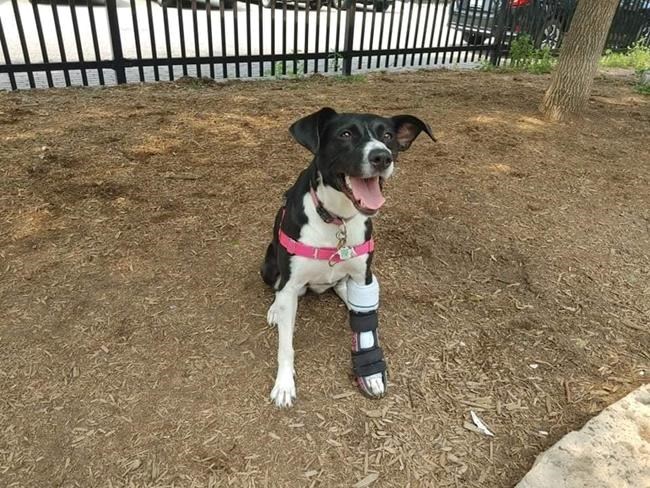Four weeks after Kiril Zvezdarov had taken Pearl, a Labrador mix, home from a dog rescue agency, she landed awkwardly while playing at a local park and broke five bones in her left paw.
“It was a really shocking event,” said Zvezdarov, a 31-year-old Toronto-based software engineer. “Luckily the Veterinary Emergency Clinic was just a half a kilometre away, so I was able to carry Pearl over and get her admitted very quickly after the incident.”
While Zvezdarov had anticipated expenses such as routine health care, insurance, foods and treats, training and walking, and equipment like leashes and toys, the health care costs to come were a bit of a surprise.
Since Zvezdarov was in the process of fostering to adopt, he didn’t yet have pet insurance to cover medical bills. The rescue agency wound up covering the initial costs of the surgery, which was about $7,000. Zvezdarov now has pet insurance, but the injury is considered a pre-existing condition, so the followup expenses weren’t covered.
“This was a very severe type of fracture that is particularly expensive to fix,” Zvezdarov said. “It’s a bit of a miracle that it was possible to treat at all.”
After the initial surgery, Pearl needed weekly bandage changes at the clinic, followup surgery to remove metal pins, four months of physiotherapy and a custom carpal brace. Zvezdarov ended up spending $7,000 out of pocket, including the dog taxi service he used to take Pearl to appointments. That amount doesn’t include general yearly caretaking expenses.
“I’m glad I was able to afford her the treatment and care that she needed to recover,” Zvezdarov said.
Zvezdarov’s experience may not be common, but when it comes to adopting or buying a pet, it’s important to plan for the unexpected.
“I think a lot of people are prepared for the costs of the expected, like food and supplies, but I don’t know how many set aside money for emergencies,” said Shauna Slobodian, owner and canine rehab therapist at Kingston, Ont.-based Pawsitively Fit Canine Rehabilitation & Wellness.
“Before getting a pet, consider what you are willing to commit financially if something happens and what your other options are if you can’t manage those payments,” she said.
Aside from emergencies, Slobodian said pet owners are less likely to prepare for vaccines, spaying and neutering costs, flea and tick medications, and health issues in general. For instance, she explained that many dogs now have allergies which can require trying different foods and medications, and multiple vet appointments. “It can add up quickly if you aren’t prepared.”
When it comes to planning for a pet, the Ontario Veterinary Medical Association estimates that, as of 2021, the annual cost of a puppy in Ontario is between $4,589 to $4,666, and $3,724 for a dog. When it comes to cats, they estimate it costs $3,091 to $3,231 a year to care for a kitten and $2,542 to care for an adult cat. These costs include basic veterinary care, food, essentials and pet insurance. The latter can be helpful for avoiding heavy expenses.
“It’s just like our own health-care insurance,” said Dr. Karla Scott, president of the Ontario Veterinary Medical Association. “You’re putting a small amount away on your premium and [insurance] will cover a large bill for you or a percentage of a large bill. It takes that financial part out of a very emotional time.”
Just like with humans, pets are more likely to develop health issues as they age. Turning to preventive medicine can not only prevent further health problems, but also cut future costs.
“Most veterinary clinics will recommend doing some kind of blood work screening annually because if we can pick up on changes early, it’s a lot easier to make lifestyle changes rather than wait until you see a problem and then try to backtrack to fix it,” said Dr. Scott.
“So, if you did blood work and tested your pet and found out that they showed up positive for heartworm prevention, but they weren’t showing any signs or symptoms of the disease, it’s a lot easier to deal with rather than two or three years down the road and your dog comes in with signs of congestive heart failure. There’s a lot of bang for your buck in preventive medicine.”
It’s important to just do your research when preparing for a pet, create a budget and play the “what if” game since pets can live with us for 10, 15 or 18 years, Dr. Scott added. For instance, if you plan to relocate or travel more in the next few years, consider those caretaking costs.
While pets can, in some cases, be expensive, they’re shown to help people improve their mental health, increase exercise, meet like-minded people, learn responsibility, and, according to some studies, contribute to a better quality of life, Dr. Scott said.
“I think the benefits of having a pet in your life outweigh the costs.”
This report by The Canadian Press was first published Aug. 3, 2021.
Leah Golob, The Canadian Press



